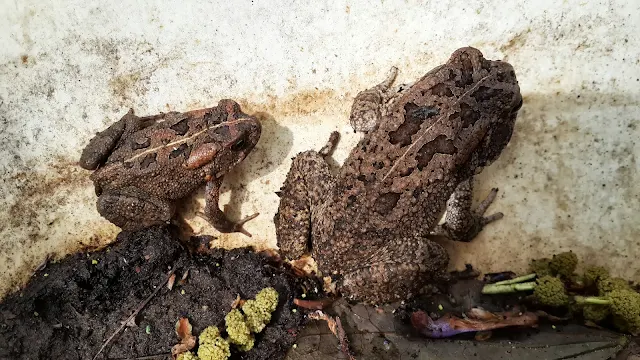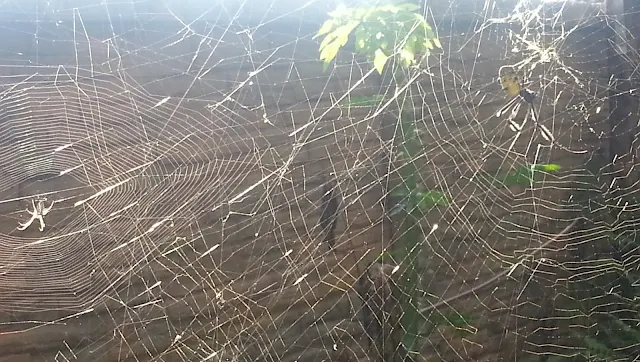Growing Organic: Nature's Truly Organic Pest-Detectors and Eliminators
 |
| The bantams are , thankfully, death on our snail population |
I love organic gardening for the myriad life forms it supports.
What we have realised is that the first year, you have sacrificial harvests - that is, you sacrifice them to the insects, in the hope that, long-term, in come the insect predators, arriving rather late and a little breathless, but all the more welcome for all that.
During our first year of depletion and deprivation, of soil that was not fertile enough, of harvests that were not resilient enough, and when our predator population was still small, having yet to determine that, indeed, here was a place they could find food, we did use organic means to control our pest population. As you may well know, in relation to our snail woes, we finally succumbed to using certified organic snail bait, and ... well, it did work, but it also wasn't very discriminating either, in that pretty much everything that ingested it, died. So, while we were delighted to find the snails eradicated for the nonce, we also discovered all sorts of other, beneficial noo-noos littering the ground with their little corpses. Such non-selective and total annihilation did not bode well for all the little critters we want to attract to the garden, to come eat of Nature's bounty, and hence could not countenance using this technique again and again and again.
I suppose, if you are a commercial concern, you aren't really interested in building up your network of predators, and cannot sacrifice your initial harvests.
However, for us, as much as we delight in foraging in the vegetable garden, we are equally enamoured of all our little birds, beasties and reptiles, such as these lovely frogs, which increasingly call the caged vegetable garden home:
 |
| The frogs love foraging for food in our vegetable garden |
We love to find, as the seasons change, all our natural predators arrive to feast on the plant lice and snails and worms. These predators include your frogs, your spiders, your lizards, your golden moles, your carnivorous beetle-eating beetles, and your birds too:
 |
| Mother hen showing her little bantams seven how to scritch and scratch in the vegetable patch |
Not to mention the nest of baby shrews, recently found in our compost heap, which were so young, they were still blind; and as small as my baby finger. We covered them up again and waited for their mother to return.
 |
| Beautiful little blind baby shrews |
Shrews are devastating on insect populations, and daily consume an amount of food equivalent to 80-90% of its weight. Hence, our little patch of land is starting to become in somewhat equilibrium, or rather, more balanced in terms of predators and prey.
Besides which, we are all concerned with the death of our bees, so essential to pollination our plants:
 |
| Bees in citrus bloom |
Colony Collapse Disorder definitely implicates a number of factors, from pesticides to disease and parasites, and it is frightening indeed to face a world in which major crops may not be pollinated due to lack of bees.
At the same time, while it's possible to be concerned by practises undertaken by agriculture - what of us and what we do?
Those of us fortunate enough to have a piece of land of which we can be custodians in this life-time, do we - work with it, or against it?
 |
| Spider web in amongst the cabbages |
You only need look at the spiders spinning webs in amongst the cabbages and rocket to find the answer. Particularly, if you take into account how the various plants are flourishing under our no pesticides regime:
 |
| Our truly organic harvest |
As Michael Pollan writes in Why Mow? The case against lawns
"Gardening ... tutors us in nature’s ways, fostering an ethic of give and take with respect to the land. Gardens instruct us in the particularities of place. They lessen our dependence on distant sources of energy, technology, food and, for that matter, interest."
I was going to call this post Nature's pesticides, but you can't really equate living things to chemical compounds. But who wouldn't love a golden orb spider hanging out in their monkey-proof vegetable cage?
 |
| Golden orb spider in the vegetable garden |
Great was our delight to discover something better than one spider, and that was two, of course, particularly when we seem to have a pair here, with the little male spider making its web within that of the larger female golden orb spider:
 |
| Male and female of the golden orb spider. |
Such, I guess, is the web of life.
Apart from the weekly treat of a visit to the veggie patch we grant to our bantams, other birds such as the thrushes, starlings and even a collared sunbird are finding the vegetable garden as a safe place in which they can forage for food, and, most importantly, drink some water.
However, much as we are training our little bantams in the joys of harvesting snails, we are keeping our large Potchefstroom koekoeks out the garden, lest they damage it too much. But herewith an album of nature's eliminators and the garden veggies which benefit equally from their services.
However, much as we are training our little bantams in the joys of harvesting snails, we are keeping our large Potchefstroom koekoeks out the garden, lest they damage it too much. But herewith an album of nature's eliminators and the garden veggies which benefit equally from their services.
 |
| Shrews |
Growing organic: because it's the natural thing to do!


Comments
Post a Comment